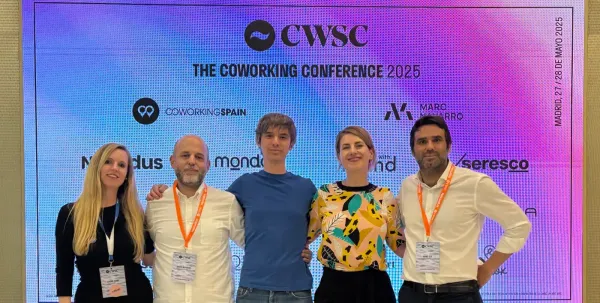COWORK is the annual conference for the coworking community in and around Germany, organized by the German Coworking Federation (GCF). This year, over 180 attendees gathered from April 26 to 28, to exchange ideas around the motto “Future Work Skills”. The event took place in Karlsruhe, hosted by Steamwork – a coworking pioneer with an absolutely stunning venue.
COWORK is always a special conference for us at Cobot. It's where we meet many of our customers and coworking friends. Each year, we return inspired, with many new connections and ideas. This time was no exception – and we’d brought a larger group than ever. Eight Cobotees, including all three co-founders, attended COWORK 2024. Here's our recap.
Coworking in Karlsruhe: Fantastic hosts and a diverse local coworking scene
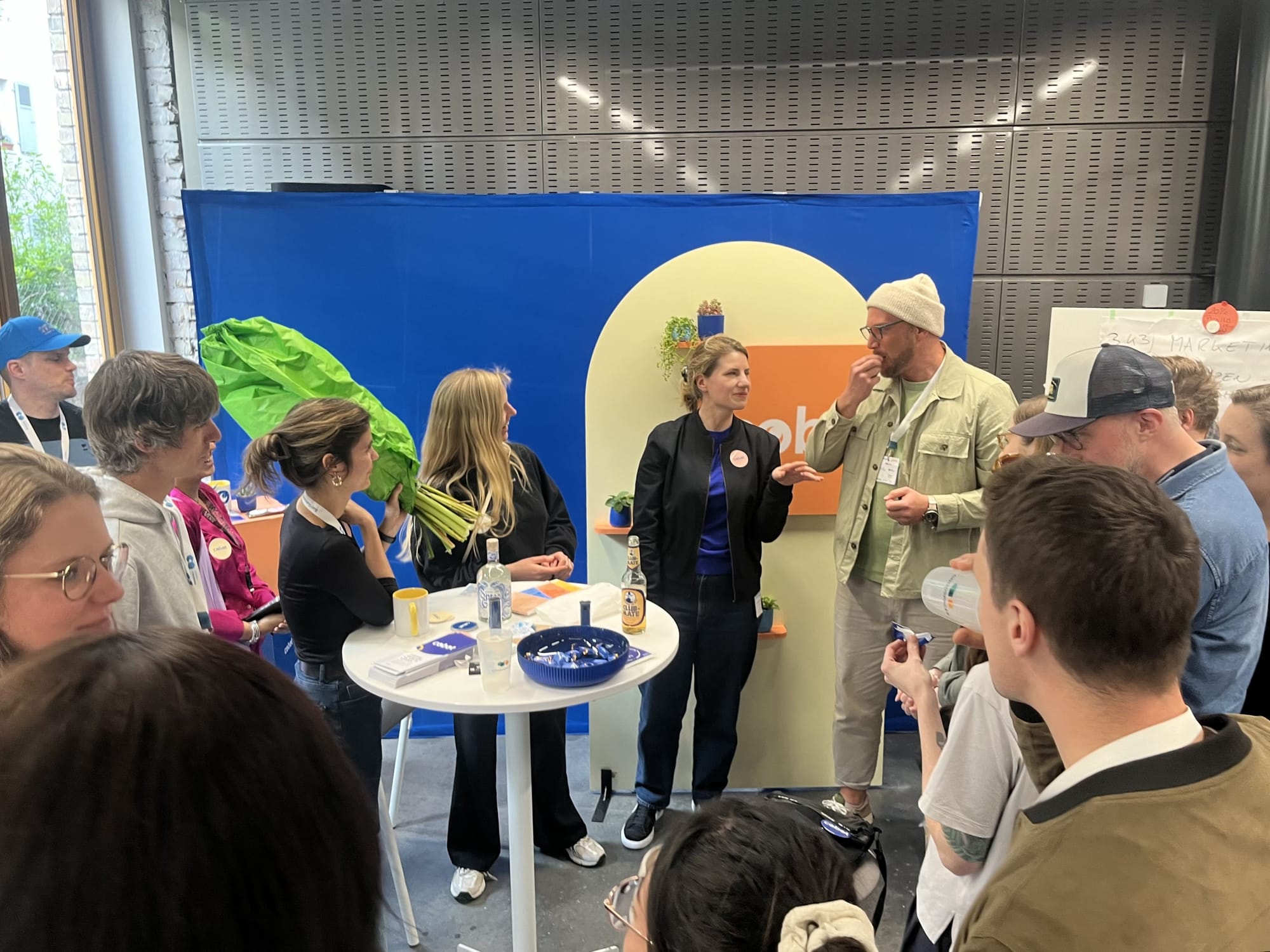
The Cobot team had been anticipating their visit to Karlsruhe for a while: it's the home of Steamwork, one of the flagship spaces of the South-West German coworking pioneers from Goodspaces.
Steamwork runs on Cobot, and we have been collaborating with their team since the beginning, accompanying their impressive growth. This year at COWORK, our teams finally got to meet in person!
Their vibrant venue, Steamwork, is located in a central but quiet area in Karlsruhe, right next to the world-famous Center for Art and Media (ZKM). It's in an old industrial building (a former steam carpentry - hence the name), which has been carefully remodeled. It now features state-of-the-art interior design, offers high-end furniture and equipment on differently themed floors, some with unique art (including graffiti by hip hop artist Samy Deluxe). Steamwork’s large event space, workshop rooms, and outdoor areas served as an excellent venue for COWORK – and the brilliant team were the best hosts a community could wish for.
We explored more coworking offerings in Karlsruhe too: We toured the local ImpactHub, an important multiplier for the local startup scene, and during a meeting at Kairos13 the shared community values of coworking and church were discussed.
Yearly reunion of the German Coworking Federation
The COWORK conference, organized by the German Coworking Federation, is not only the association's annual main meeting but also feels like a yearly family gathering where old friends meet and new connections are formed. In her opening notes, GCF board member Dina Sierralta reminded us of the federation’s history. The GCF was founded in 2015 and celebrated its 9th founding anniversary on the day of the conference, adding to the sense of festivity and community!
In addition to organizing events such as COWORK and the Coworking Festival, the core tasks of the GCF revolve around providing value to their members. For instance, the federation assists with member acquisition, provides practical advice, conducts workshops, and promotes coworking both publicly and politically.
If your space would like to benefit as well: We recommend joining the GCF – of course, Cobot has been a member since the beginning!
Status of Coworking in Germany
Carsten Foertsch of Deskmag presented early results from the Global Coworking Survey 2024, with a focus on German spaces. Around 50 spaces participated, and the good news is that more than half of them share an optimistic outlook on the future of their business and report an economic improvement. However, we're still not back to pre-pandemic financial stability. 22% of spaces still report that they're not doing well.
Curiously, German coworking spaces, when compared internationally, are generally less profitable. Why is this the case? According to Carsten, Germany has a high number of small spaces (68% operate on less than 500sqm), which makes it difficult to generate profit. Another factor is the large proportion (29%) of not-for-profit spaces, as well as the ongoing challenge of popularizing the coworking concept in smaller towns and rural areas.
Part of the survey focused on the pain points of German coworking spaces: The most frequently reported problem is the acquisition of new members (55%), followed by insufficient demand (45%), and increasing costs (41%).
The survey concluded with a question about what coworking spaces need most from an association – a direct reflection of their challenges: Public relations and lobby work to make the coworking concept widely known, support with member acquisition, and consulting on financial and legal topics.
Prof. Dr. Johanna Bath: The Future of Work
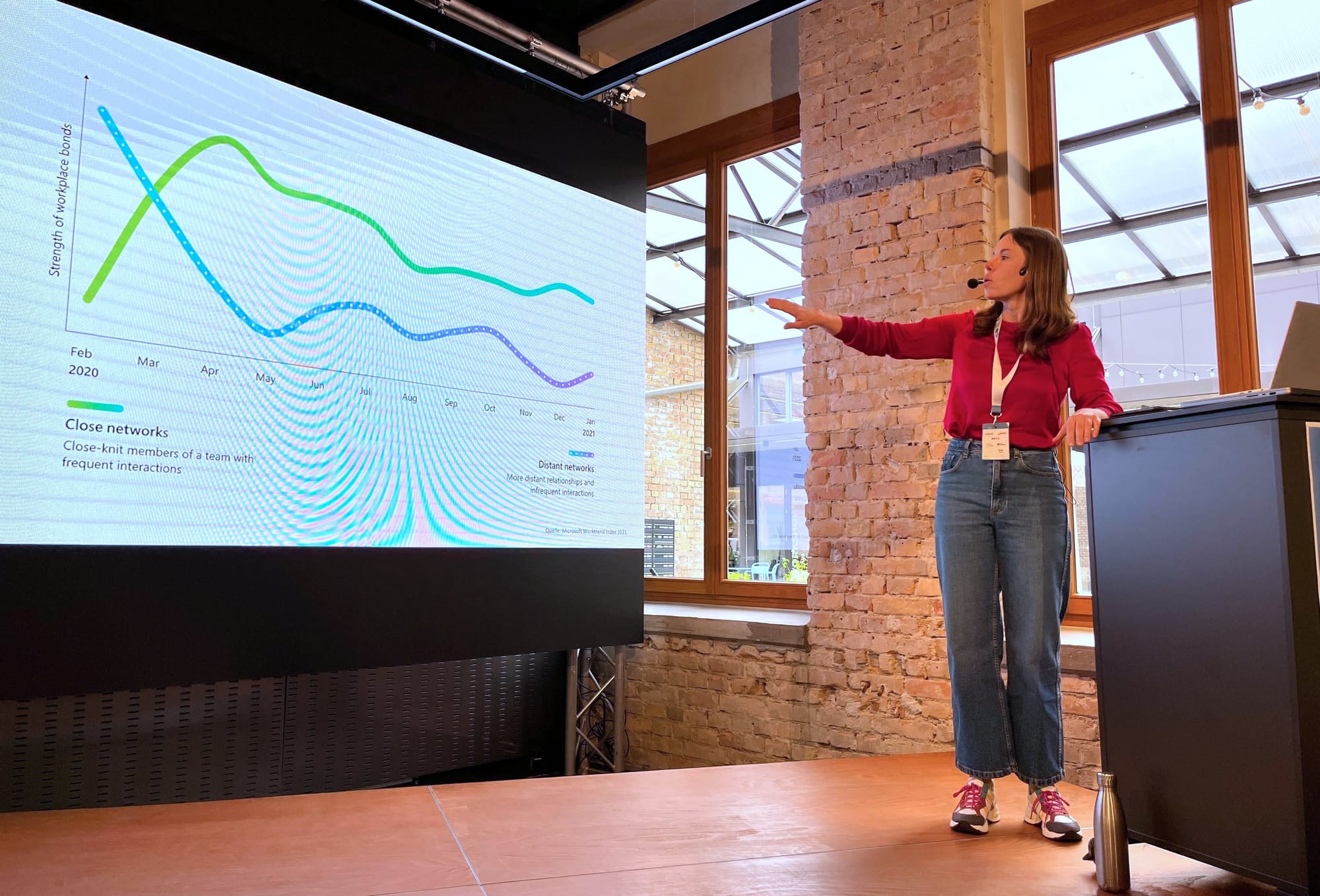
There are these rare keynotes that leave the audience on the edge of their seats – and Prof. Dr. Johanna Bath's talk was one of these. The ESB business school professor shared insights from her work as Hybrid Work Advisor with insights from her practical work with large corporate employers. Bath shared fascinating facts on how impactful a well-supported work environment with humane work policies is for employee satisfaction and productivity. About halfway through the presentation, a lively discussion with contributions from the space operators in the audience had developed.
Employer attractiveness is not a project, but the core competency for the next 10+ years - Johanna Bath
An optimistic learning we're taking away is that coworking spaces are at the forefront of creating work environments that increase employee satisfaction, where real connections and innovations flourish. They are designed for human needs and relationship building.
Companies need to create opportunities for people to establish real connections. People need people. This is a clear driver for coworking - Johanna Bath
Sven Urselmann
Sven Urselmann's keynote on the urgency of tackling climate change reminded us: the changes needed to keep the global temperature increase under 1.5 degrees are not happening. In a passionate call to action, he introduced the concept of shifting away from blaming individuals for their “footprint” and instead actively working towards a positive “handprint”.
"We really need to take action. Let's get started!" - Sven Urselmann
Sven had inspiring successes to share: As a crafty entrepreneur with his own interior design and fitting company, he set out to work sustainably. Under the motto “Form follows availability”, he sources his materials depending on what can be found and reused, following the cradle-to-cradle system, a circular economy philosophy. Examples include using old chairs as wall coverings or leftover cable trays as flower pots. As a next step, he is looking into setting up a construction material business, which sources raw materials from recycling. These actions have a much bigger carbon reduction impact than focussing on his personal carbon footprint only.
Barcamp and an announcement: Coworking Festival goes BIG!
Following the coworking values of openness and collaboration, one entire day of the conference follows the bar camp format, where anyone can pitch and lead a session. More than 30 sessions were held – we’re sharing insights from a few that we found particularly useful or inspiring:
Julianne Becker: Coworking Festival Germany
Julianne Becker of Coconat presented the Coworking Festival idea, along with a major announcement: This year, for the first time, the Coworking Festival will be held across Germany!
Save the date: The Coworking Festival will take place from September 23-27, 2025.
The Coworking Festival is a week-long, decentralized event where spaces open their doors and invite the public to experience coworking. It provides an opportunity to engage with the wider community, popularize the coworking concept, and celebrate the coworking community. A central website, event calendar, and marketing event will be provided by the organizers, among them our cofounder and festival creator Thilo Utke, as well as ambassadors of spaces in all 16 German states. Further news will be available on the festival website soon.
Björn Budack: Hot/Flex/Fix/Office: How has demand changed?
Björn Budack from Kiez Büro led a discussion on the changes in customer demand for coworking spaces. Here's a glance at the main contributions:
- Flexibility is increasingly important, with customers favoring individual passes over long-term memberships, despite missing out on savings.
- Coworkers are looking for flexible “X days per month” plans
- Digital postal addresses have become a significant revenue source for some spaces.
- Phone booths and private areas for calls are in high demand.
- Team offices are becoming essential.
What truly made us happy and quite proud during the session was the enthusiastic commitment and valuable insights shared by our customers. Their stories underscored how Cobot empowers them to adapt swiftly to evolving coworking needs!
Dr. Alexandra Bernhardt: Corporate and Coworking
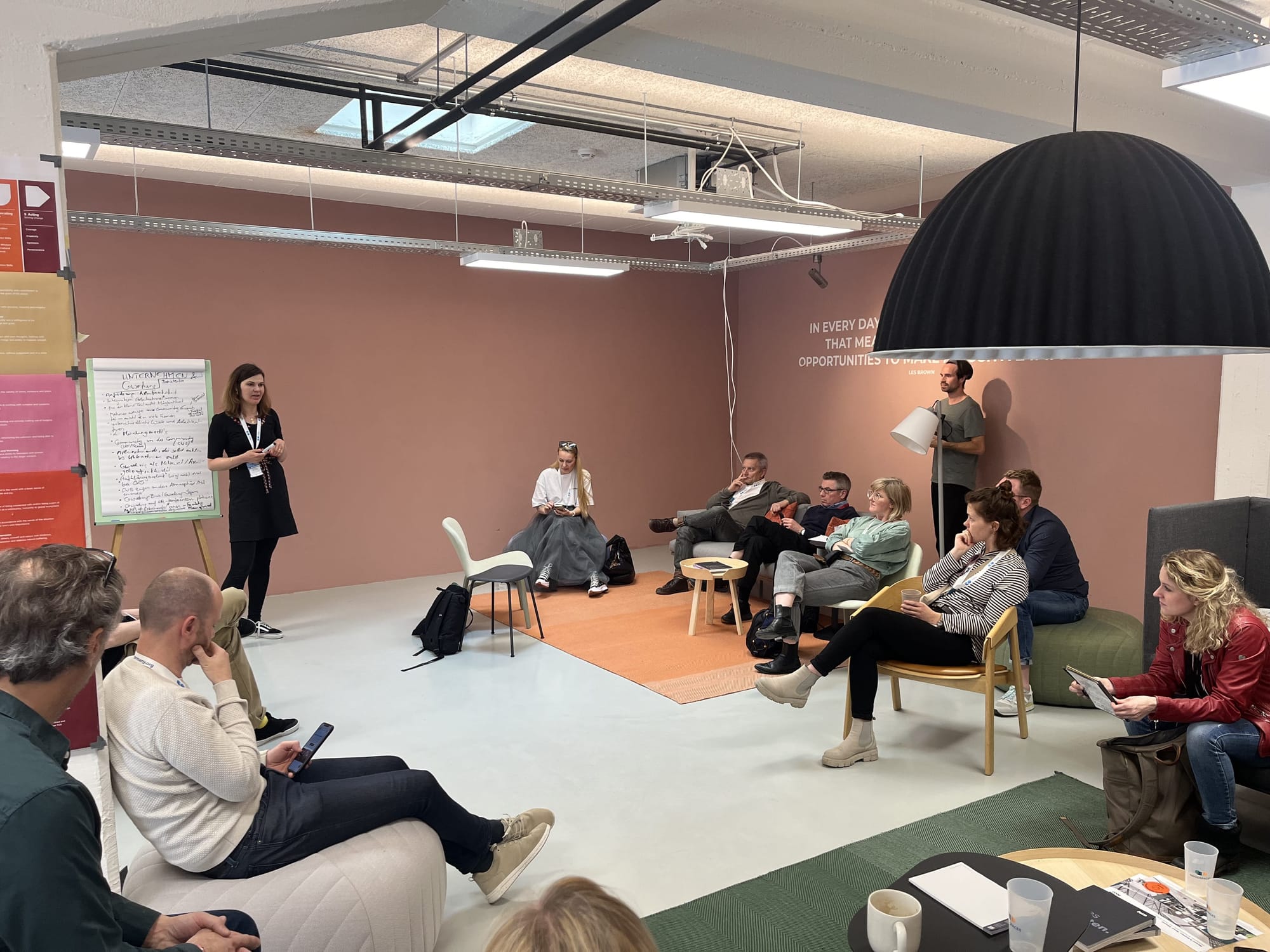
Dr. Alexandra Bernhard, coworking researcher and consultant at ZeTT Thüringen lead a session about Corporates and Coworking. She opened with the fact that 96% of remote employees still work from home. Some specific work place needs were collected in the group, like certified data protection and work place ergonomics. The group identified challenges with integrating corporate employees into a space's community. There was a consensus that it is not a problem with single employees but with teams. Successful approaches mentioned are face-to-face invitations to events, done not only by a community manager but also through coworking members, e.g. with a buddy system.
On the other side of the equation, it is also important to get the employer on board. Here it is critical to highlight the value for them. Occasionally, they see coworking spaces as a treat, as they show a different work atmosphere than the corporate environment. An interesting insight was that in most companies, the facility management department has a higher significance than the HR department. Having some strong operational and financial arguments might get you further to get one of the popular framework coworking agreements that ensure you a steady income and easy coworking access for employees. A third party that must be considered is worker unions, which are strong in Germany. They have similar regulatory requirements as employers, but can be a valuable ally to bring more corporate employees into coworking.
Tim Schabsky: Staff Recruitment for Coworking
Tim Schabsky, cofounder of WorkInn, led a session about the difficulties of recruitment in the coworking industry, and how to hire successfully.
He shared a success story of their “Feel Good Manager” who initially started in a janitorial role but showed great talent and was well-received by the community. As the manager became the go-to person for many issues, assistants were hired to help manage the workload. Schabsky emphasized the pitfalls of trying to “clone” oneself and recommended outsourcing or dividing functions, like collections and sales (but not tours). He also recommended seeking employee feedback on problem areas and letting the organization make decisions based on this feedback.
Some concrete practical tips for hiring were exchanged too: Choosing the right job titles to attract applicants. Tim suggested using simple terms such as “Service Employee” and then detailing the role in the job description. From the audience came the idea of collaborating with the Chamber of Commerce (IHK) to find candidates. Tim shared his good experience at WorkInn with student workers, despite their tendency to leave after a while.
Quality Sunday
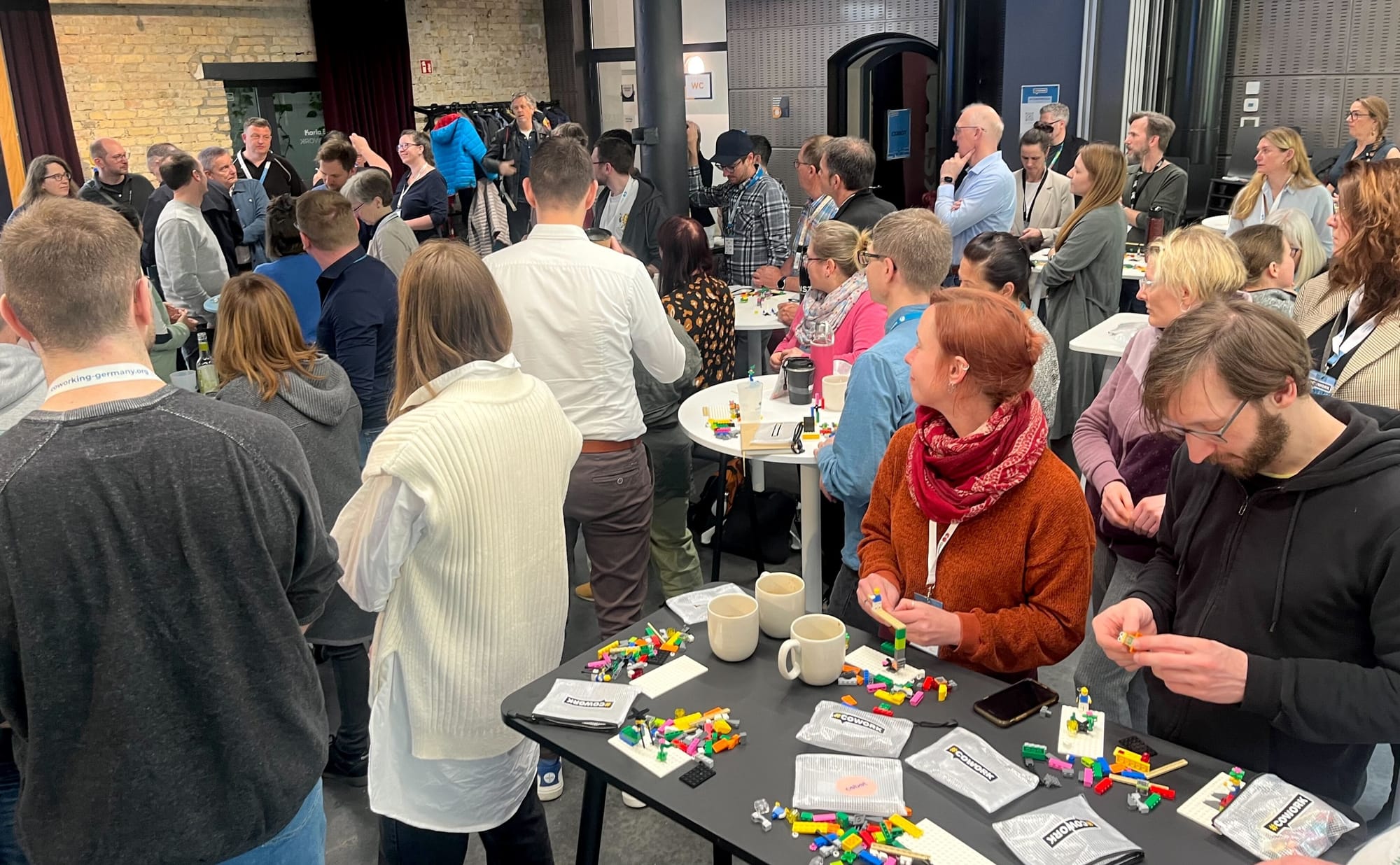
As is tradition, COWORK2024 ended with the “Quality Sunday”, which focused on reflection and inspiring group activities.
At the start of the day, the Gregor Valentin Sturm, Sustainability Manager at 1000 Satellites shared the collaborative work with the GCF on a sustainability guideline for the GCF coworking spaces, that is now available for all GCF members.
Next up, a hall full of grown-ups explored how you can approach complex topics through building with Lego, following the Lego Serious Play method. It showed us how the visual and haptic approach helps to break these down and find creative visualizations with a lot of fun.
… and next year, Berlin!
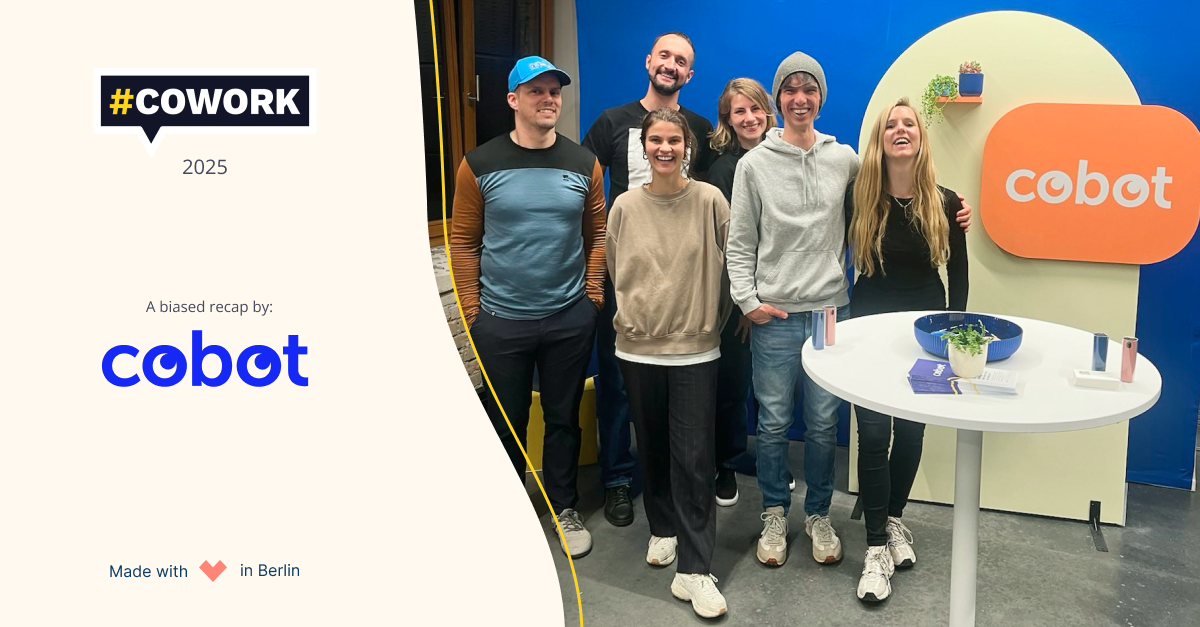
And then, before the event ended with lunch and final goodbyes, the big news about next year’s coworking conference was shared: COWORK2025 will take place in Berlin! From March 28-30 2025, the coworking community will gather in Cobot’s home city, and we can’t wait.
It has been a great event for us as attendees and sponsor thanks to the great organizing team by the GCF, excellent hosting by the GoodSpaces Team at Steamwork and of course the wonderful German coworking community.
See you all next year in Berlin, Germany!


